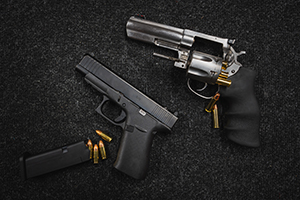Connecticut General Statutes § 29-28 – Pistol and Revolver Permits

Connecticut has some of the strictest gun laws in the country, and at the center of those laws is C.G.S. § 29-28, which controls who may lawfully receive a permit to carry pistols and revolvers.
Every week, I meet clients who thought their out-of-state gun license was valid here, or who misunderstood how the Connecticut permit process works. Others were denied a permit because of old criminal records, restraining orders, or background issues. The consequences are serious: without a valid Connecticut-issued permit, carrying a pistol becomes a felony under § 29-35.
What the Law Says: § 29-28C.G.S. § 29-28 gives authority to issue pistol permits to local police chiefs, resident state troopers, or borough officials. The law requires applicants to:
- Be at least 21 years old
- Pass a criminal background check and be a “suitable person”
- Complete a state-approved handgun safety course
- Not be prohibited under state or federal law (felony record, certain misdemeanors, restraining/protective orders, substance abuse issues, or mental health disqualifications)
If the local authority approves, the applicant is issued a temporary 60-day permit, which must then be validated into a statewide permit by the Department of Emergency Services and Public Protection (DESPP).
Common Reasons People Get in Trouble Under This Law- Out-of-state permits — Connecticut does not recognize pistol permits from other states. You must apply for a Connecticut permit.
- Denied applications — A denial doesn’t give you the right to carry; appealing through the Board of Firearms Permit Examiners is required.
- Old convictions — Even misdemeanor convictions like breach of peace, threatening, or certain drug offenses can bar eligibility.
- Restraining or protective orders — A current or past order can disqualify you from approval.
While § 29-28 itself governs issuance, the consequences for carrying without complying fall under related statutes:
- Carrying a pistol without a permit (§ 29-35) – Class D felony, up to 5 years in prison and $5,000 fine.
- False statements on a permit application (§ 29-37) – Felony offense.
- Possession after revocation – Treated the same as no permit at all.
If you are accused of carrying without a permit, or denied under § 29-28, there are several possible defenses:
- Challenging “suitability” determinations – Local authorities sometimes deny permits for vague or unfair reasons. These can be appealed.
- Mitigation and diversion – In cases where someone is charged criminally, showing responsible background and pursuing Accelerated Rehabilitation may protect your record.
- Unlawful search and seizure – Weapons found during an unlawful stop may be suppressed.
For many first-time offenders charged with carrying without a permit, the Accelerated Rehabilitation (AR) program can be a lifesaver.
AR is a diversionary program that allows your case to be dismissed after a period of probationary supervision. Importantly:
- You do not plead guilty.
- The judge imposes conditions such as staying arrest-free, completing community service, or taking safety courses.
- If you successfully complete the program, your case is dismissed and your record stays clean.
This is critical in firearms cases because a felony conviction doesn’t just mean potential jail time — it also means the permanent loss of your gun rights. By using AR, many clients are able to avoid a felony record and preserve their future.
Collateral ConsequencesBeing denied or arrested under Connecticut’s permit laws can affect far more than just your ability to carry:
- Employment – Certain jobs require security clearances or licensing that depend on a clean record.
- Immigration – Gun-related offenses can be serious problems for non-citizens.
- Reputation – Arrest records are public, and gun charges are often misinterpreted as violent conduct.
- § 29-35 – Carrying a pistol without a permit
- § 29-37 – False statements in firearm permitting
- § 29-32b – Board of Firearms Permit Examiners procedures
- § 53a-217 – Criminal possession of a firearm
Yes. Connecticut does not honor out-of-state permits.
Can My Old Misdemeanor Stop Me From Getting a Permit?Yes. Convictions for crimes like threatening, breach of peace, or drug offenses can disqualify you.
What if the Police Chief Denies My Permit?You can appeal to the Board of Firearms Permit Examiners.
Can My Permit Be Revoked?Yes. If you’re arrested, subject to a restraining order, or deemed unsuitable, DESPP can revoke your permit.
Is There a Waiting Period to Apply?Yes. You must complete a handgun safety course before applying, and the process can take weeks.
What if I’m Caught Carrying Without a Permit?You could be charged with a Class D felony under § 29-35.
Final ThoughtsGun laws in Connecticut are strict and unforgiving. Many good people who would never dream of committing a violent crime find themselves facing felonies or denials simply because they misunderstood the permitting process.
If you’ve been denied a permit, are facing charges for carrying without one, or need to appeal a revocation, I can help. With over 30 years of experience, I know how to protect your rights, guide you through the BFPE process, and fight to keep your record clean.
📞 Call Allan F. Friedman, Criminal Lawyer at (203) 357-5555 or contact me online for a confidential consultation.
 Allan F. Friedman Criminal Lawyer Home
Allan F. Friedman Criminal Lawyer Home











